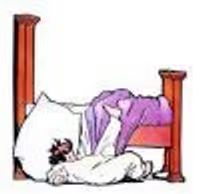Can Someone Please Help Me Understand "Finishing The Hat"?
Fenchurch
Broadway Legend Joined: 11/16/06
#25re: Can Someone Please Help Me Understand 'Finishing The Hat'?
Posted: 7/25/07 at 11:16am
Isn't it Sundays without the Apostrophe?
I think its about a common male problem, this personal goal that he thinks everyone should accomodate their lives around, finishing the hat is important to him, but not so important to Dot, and if he loves her, should he not be sensitive to her needs as well as his own?
Perhaps he does not love her with the same intensity as he loves his art, I think that's fairly clear, but when you examine that, it's fairly selfish.
I have a problem with the piece in that sense, George is NOT a sympathetic character, but then again, that's the beautiful agony of the piece. We are all often selfish when it comes to our goals, artistic or otherwise. What bothers me is when people (fans) glorify George for it. He may be a legendary artist, but I would rather strive to be remembered as a good person.
"Fenchurch is correct, as usual." - muscle23ftl
#26re: Can Someone Please Help Me Understand 'Finishing The Hat'?
Posted: 7/25/07 at 11:29am
So you think George is finishing the hat just to satisfy himself?
Is that why artists create their work?
Merely as a self-fulfilling goal?
Finished the hat. Check. Now, onto the next selfish goal.
I think on the surface it can appear that way, and I think that's what Dot is struggling with... but in the end, I don't think you're digging deep enough into why artists "have" to create.
blocked: logan2, Diamonds3, Hamilton22
Fenchurch
Broadway Legend Joined: 11/16/06
#27re: Can Someone Please Help Me Understand 'Finishing The Hat'?
Posted: 7/25/07 at 11:33amAnd those reasons are? Just to play Devil's Advocate. While I DO understand the creative urge, I don't think it can't be reconciled with the social one. To denigrate relationships in order to satisfy the need to create just sullies both. I don't understand why both can't coexist.
"Fenchurch is correct, as usual." - muscle23ftl
#28re: Can Someone Please Help Me Understand 'Finishing The Hat'?
Posted: 7/25/07 at 11:37am
Well, I explained exactly what I felt the reasons were in my first post here, Fenchurch. But maybe you didn't read the whole thread before asking.
I'll make it easy for you now and copy/paste:
George has trouble connecting. His window into the world is his art. He "sees" and relates to the world by painting.
The only way he knows how to express his feelings for Dot, and for life in general, is by "finishing the hat" (which is symbolic of whatever he is working on at the moment). It's an obsession with him, but it's also a necessity.
Without "his finished hat" he is lost. He hasn't fully expressed himself.
That's how he is able to relate, sort things out, respond to, and understand the world.
By finishing the hat.
blocked: logan2, Diamonds3, Hamilton22
#29re: Can Someone Please Help Me Understand 'Finishing The Hat'?
Posted: 7/25/07 at 11:39amI've always thought the song was him saying that while he wants Dot to stay with him, he cannot forget his obsession with his art, and he comes to terms with the fact that his art will always keep him from having Dot.
Fenchurch
Broadway Legend Joined: 11/16/06
#30re: Can Someone Please Help Me Understand 'Finishing The Hat'?
Posted: 7/25/07 at 11:43am
Wonderfulwizard, I agree. And that's just his problem.
Best12bars, I read that, that's my point He has a problem. So why are we applauding him because he has issues? It's something to be avoided, not celebrated.
"Fenchurch is correct, as usual." - muscle23ftl
#31re: Can Someone Please Help Me Understand 'Finishing The Hat'?
Posted: 7/25/07 at 12:07pm
"It's something to be avoided, not celebrated."
Why?
Who says one choice is more correct or worthy than the other? What makes one selfish and the other not. Choosing the girl would get him sex, companionship, etc. Why wouldn't that be considered selfish over the more noble generous act of creating art that may inspire the world?
Choosing the relationship may be the noble choice for you. But who can say what the noble path is for someone else? I understand that you don't find him a sympathetic character. But he certainly is for people who relate to what he's going through. Maybe that's why this is the favorite musical of all my artist friends, not so much with the non-artists.
Fenchurch
Broadway Legend Joined: 11/16/06
#32re: Can Someone Please Help Me Understand 'Finishing The Hat'?
Posted: 7/25/07 at 12:13pm
But wouldn't the best solution be to...I don't know. Follow the golden rule? Treat others as you would want to be treated?
My point is that the real solution is to treat your interpersonal relationships with as much as care as your art. It doesn't have to be either/or. It can and should be the same, for our relationships are all we truly have, and those relationships enhance our art.
I'm surprised...
"Fenchurch is correct, as usual." - muscle23ftl
#33re: Can Someone Please Help Me Understand 'Finishing The Hat'?
Posted: 7/25/07 at 12:38pm
"But wouldn't the best solution be to...I don't know. Follow the golden rule? Treat others as you would want to be treated?"
But he doesn't want to be treated that way himself. And it's not as if he mistreats Dot. He just can't meet her expectations for what she wants a boyfriend to be. He treats her well by always being up front about what he can be for her. She just chooses not to settle for it and leaves.
So I don't really see how your golden rule analogy applies here. Unless the golden rule has been changed to, "You should live up to others' expectations, no matter what they are, just as you would like others to live up to yours."
Fenchurch
Broadway Legend Joined: 11/16/06
#34re: Can Someone Please Help Me Understand 'Finishing The Hat'?
Posted: 7/25/07 at 12:42pm
I don't know if I agree that he doesn't mistreat Dot. He does promise to take her out, and that was because of something else he didn't do, if I recall correctly, and then forgets about that date.
In that moment, he decides on his art instead of Dot, after he has already made a promise to her.
That's mistreatment in my book. Whether by absent mindedness or malice, it's still mistreatment.
"Fenchurch is correct, as usual." - muscle23ftl
#35re: Can Someone Please Help Me Understand 'Finishing The Hat'?
Posted: 7/25/07 at 12:55pm
"That's mistreatment in my book. Whether by absent mindedness or malice, it's still mistreatment."
But is that one incident enough to paint him as an unsympathetic character? Or support your theory? It's just an illustration of their incompatability and not much different than you'd see in any relationship, really. I think you're reachin' now, Fenchurch.
But I'll give you a quote for the effort:
Fenchurch is correct, as usual. ![]()
Fenchurch
Broadway Legend Joined: 11/16/06
#36re: Can Someone Please Help Me Understand 'Finishing The Hat'?
Posted: 7/25/07 at 1:03pm
One incident in reality is not indicative of a problem in a relationship.
One incident in a theatrical piece is. Otherwise it would be wasted text, etc.
"Fenchurch is correct, as usual." - muscle23ftl
#37re: Can Someone Please Help Me Understand 'Finishing The Hat'?
Posted: 7/25/07 at 1:09pm
Right. But the question is, what exactly is the problem it's indicative of? You say mistreatment. I say bah! It's incompatibility of expectations, a difference in priorities and a strong pull towards his art and away from her.
What? You're not going to add my quote to your pile? I feel mistreated!
Fenchurch
Broadway Legend Joined: 11/16/06
#38re: Can Someone Please Help Me Understand 'Finishing The Hat'?
Posted: 7/25/07 at 1:13pm
as: I'll get to it, but I'd like to earn it :)
I agree with you, it is definitely incompatibility, but that doesn't excuse a broken promise, does it?
This man has dealt with his craving to create for his entire life, he should, in my opinion, know better than the to committ himself to an obligation he is not going to fulfill, but then again, the piece is about growing, but I see very little growth in the 1st act George. I see the seeds of growth in the second act George, but that doesn't make Georges Seurat a good person as a character.
"Fenchurch is correct, as usual." - muscle23ftl
#39re: Can Someone Please Help Me Understand 'Finishing The Hat'?
Posted: 7/25/07 at 1:44pm
You're right. It doesn't excuse a broken promise. And you're also correct in that act I is more about Dot's growth than Georges'. (there, does that earn you the quote?) But I still say you're stretchin' it if you're gonna persist with this whole golden rule theory.
Georges is not an unsympathetic bad guy just because he's not the ideal boyfriend. He's a complex person. So is Dot. That's their story; two people struggling to find their way in life. If they weren't complex people we wouldn't care about their story and it would never have made it to the stage.
I'm sure Edna Turnblatt, being agoraphobic, has disappointed little Tracy on more than one occasion. But we still see Edna as a sympathetic character. These issues make these characters human and it's the reason we watch them with fascination to see how they deal with them, whether they grow or not.
My point is that he's not a bad man with issues we should avoid having . Issues are issues. You don't avoid them. Either you have them or you don't. The question is whether or not, and how, you deal with them. Georges is a complicated man who struggles toward choices that may seem a little crunchie to some folks. but should be honored for the tough choices they are. You don't have to celebrate them, but honor them. The choice may have been mistaken, the choosing was not.
Fenchurch
Broadway Legend Joined: 11/16/06
#40re: Can Someone Please Help Me Understand 'Finishing The Hat'?
Posted: 7/25/07 at 1:47pmAS: Agreed.
"Fenchurch is correct, as usual." - muscle23ftl
#41re: Can Someone Please Help Me Understand 'Finishing The Hat'?
Posted: 7/25/07 at 1:54pm
Fenchurch, you're my new favorite poster. I'll have to unblock you. ![]()
#42re: Can Someone Please Help Me Understand 'Finishing The Hat'?
Posted: 7/25/07 at 2:25pm
I think artscallion is completely right. Maybe Hollywood has convinced us that the point of life is to get the girl and find your fairy tale ending--but in Sunday in the Park, it's about chasing your passion. Both George and Dot had or found things in their life more important to them than being together.
Surely you can't tell me you've never had to hurt people to follow after a goal. It's incidental, almost.
Also, I got the feeling from the text that George treated his mother pretty well, the only character he really owed anything as far as that golden rule thing goes.
joey
#43re: Can Someone Please Help Me Understand 'Finishing The Hat'?
Posted: 7/25/07 at 6:44pm
So you're saying that George's character has trouble connecting and maintaining relationships, prefers his own obsessive, solitary activities to being with others, and may even have a sense that his creation is mightier and more noble than other pursuits in his life?
That's exactly what I said in my last post, except that it was couched in psychological terminology.
None of which answers the question of how we are "supposed" to feel about George, but it does give me a great deal of sympathy for him. He made a choice (to finish the hate) he felt completely compelled to make.
#44re: Can Someone Please Help Me Understand 'Finishing The Hat'?
Posted: 7/25/07 at 8:04pm
I actually think George did the best thing he was capable of with Dot: put her front and center of his painting. That is the only way he knew how to relate and from George, it was the most meaningful thing he could possibly do for her.
Dot herself, in a bit of a contradicting way, realized the truth about George as well. Though she taunts him to say anything he's feeling, she realizes one thing: he's "complete." He just needed his creation, he didn't need her to be complete. He couldn't have been complete with her but without the art.
I don't think anyone glorifies George for choosing art over Dot, they applaud the art of creation. Imagine if he chose Dot instead of his art: he never would have been complete, they would never be happy together, probably eventually break up, and then there wouldn't be a relationship or a painting.
It's hard to find him complete unsympathetic with the way he describes his creation...making things where there never were, seeing beauty in everything, "revising the world."
Videos







